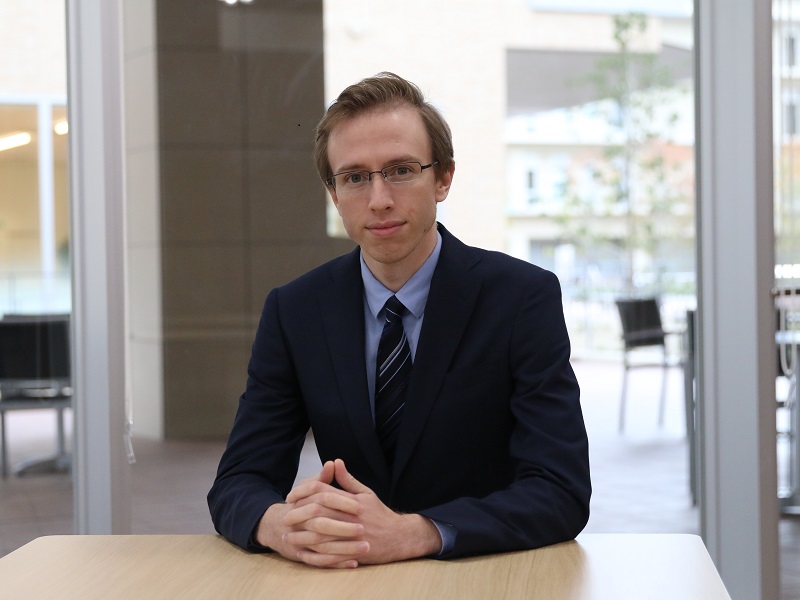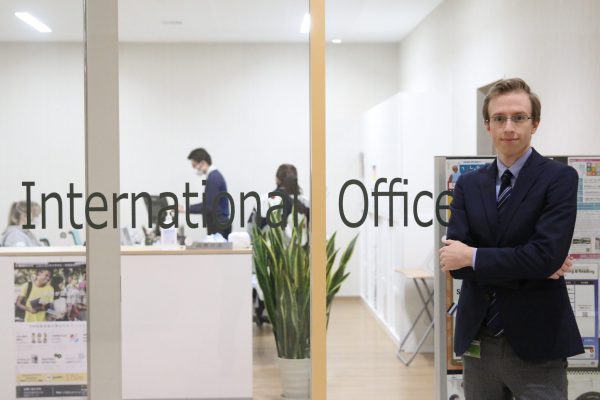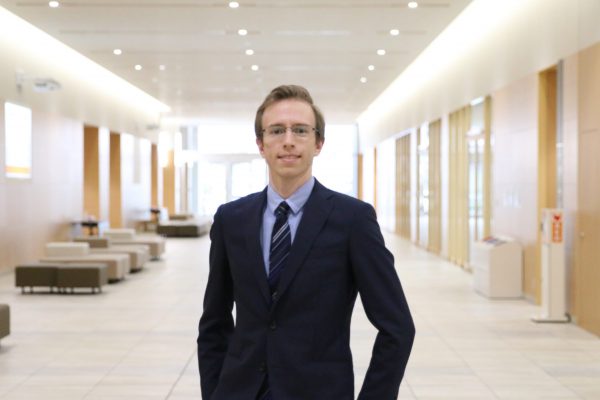When I changed jobs, I think I was able to find a position that was much closer to my specialization.
Kyoto University of Advanced Science (KUAS)
Michael Smith (From United States of America)
Sekolah:Kyoto University's Graduate School Human and Environmental Studies
* Wawancara tahun 2021

What school did you attend, and what department did you study in?
I graduated from Kyoto University’s Graduate School of Human and Environmental Studies with a master’s degree.
I was researching the sociological aspects of disaster prevention.
Before entering Kyoto University, I came to study at Ryukoku University as an exchange student for two years in 2007 and 2008.
After that, I worked in Japan for two years on the JET program. It was the Fukushima earthquake and tsunami that sparked my interest in studying natural disaster prevention in graduate
2. What made you decide to study abroad in Japan, and in Kyoto?
When I was a high school student, I did a homestay in Shiga Prefecture. During that time I had opportunities to go to Kyoto City, and from that experience I decided to enroll in a university in Kyoto.
I was already interested in modern Japanese culture, but it was the laid-back nature of Kyoto City’s greenery and its river that really attracted me.
3. Are there any memories that stick with you in particular from your study abroad experience?
When I was in college and in grad school, I worked part-time to support myself.
Balancing work and study was difficult at times, but I think it was a valuable experience because it definitely helped me to improve my Japanese and my people skills.
I did many different kinds of jobs.
I was a bartender at a karaoke place, woke up at 4:00 a.m. to do newspaper delivery on my bicycle, and did welding at a factory.
At the welding job in particular, at first I really couldn’t understand the directions I was being given, and it was a bit scary, but my desperation helped me learn a lot. I think it’s really important to put yourself in a situation where you feel the pressure.
4. How did you go about job hunting?

To be honest, I had a very hard time finding a job that suited me after graduation. After working at one company for a while, I decided I wanted to use my knowledge of international relations more, so I registered on a job site for bilingual people.
There was a difference in how I’d looked for jobs as a new graduate versus how I made the search mid-career.
As a new graduate, though my university studies were taken into consideration during interviews, I was given a generalized job within the company.
When I changed jobs, I think I was able to find a position that was much closer to my specialization.
Both times, I made use of online resources much more than in-person seminars and information.
I made my profile from scratch, reached out to a headhunter, and got ready to sell myself with the content of that profile.
When I was a new graduate, I’d had to complete a lot of written tests, but it was much simpler when I was changing jobs.
At Kyoto University of Advanced Science (KUAS), where I currently work, I don’t see any of that old-fashioned work style. Work is rewarded based on merit, and there’s a good working environment. There’s a system in place for recognizing those who do their work the most efficiently.
If you’re job-hunting in Japan, I recommend considering not only finding work straight out of graduation, but also making a mid-career job change.
5. Please share how you found out about your current job, and the reason you decided to work there.
After registering online, an agent told me about a job opportunity at Kyoto University of Advanced Science. After that, I read about (KUAS Chairman) Nagamori’s mission to reform the way universities operate in Japan, and I was deeply impressed.
From here on, I’d like to work hard to differentiate us from the other universities.
We’re already in the process of creating that environment by actively reaching out to invite administrators and teachers overseas.
6. Please tell us what you do at your current job, and what you like about it.
I am currently working in the KUAS International Office, where I work as a key person in new student recruitment, on-campus student support, and language support. Since joining the university, I have had the honor of interpreting for CEOs of major companies as well as a former prime minister.
I take great pride in my work because I am now in a position to provide the kind of support that I wanted to receive as a student to the international students of KUAS.
We’ve only just begun, but we’ve already set specific goals, like making sure half the students in the Engineering Department are international students in the next five years, and making sure half of those students are female.
KUAS is also putting a lot of effort into education in English. Classes in our new Engineering Department are conducted entirely in English, English is a requirement of our faculty, and half of that faculty are non-Japanese. We’re offering classes in English that Japanese and international students can take together.
The courses that have carried over from when the university was known as Kyoto Gakuen University are currently offered in Japanese, but we have plans to make new programs in English.
The number of universities offering English course credits can still be counted on one hand, so I want to do my best as one of the forerunners.
7. I’m sure the coronavirus has made things difficult, but are online classes going smoothly ?
I think we’ve been very good at adapting to online classes. Because we’re a new university, we’re able to be flexible, and we’re very proactive about introducing new technology.
We’re also offering a hybrid style of mixed online and in-person classes.
One of our design classes is one example: students make their designs at home, send the data to the school, and then come to campus to make it take shape with the 3D printers. The teacher can see their actual finished pieces, and the students are able to participate in competitions against their classmates’ pieces.
8. Please share a message for students who might be thinking about studying abroad at Kyoto University of Advanced Science.
From my own experience, I can say that going to a prestigious university does not necessarily lead to professional success.
When it comes to a university, the most important thing is how much support the teachers and staff are willing to provide in order to lead their students to success.
At KUAS, we go to great efforts to ensure that all students find a good job after graduation. This includes everything from providing in-depth career counseling and internship opportunities to making sure that students have the bilingual skills, people skills, and professional skills that will make them immediately viable in the workplace.
When imagining futures for our students, we’re not only thinking of finding work in Japan.
Thanks to Mr. Nagamori, we have a strong connection to Nidec Corporation, and through the company we’re able to gather information from all over the world, and to introduce students as interns.
9. Could you share some advice for international students who are looking for work in Japan?
Of course, the purpose of job-hunting in Japan is to find a job, but if you approach it as an opportunity to study Japanese culture, I think it can lead to further personal growth. Job-hunting gives you the chance to listen to many people speak about their companies, so it’s a good opportunity to broaden your horizons.
Lastly, I strongly recommend that you participate in many mid- and long-term internships.
Japan has a lot of one-day or one-week internships, but in other countries, longer internships of up to one year are common. With a long-term internship, you’ll be able to understand the essence of the job. Be sure to actively look for them at career centers. If not in Japan, I recommend including internships overseas in your considerations!






